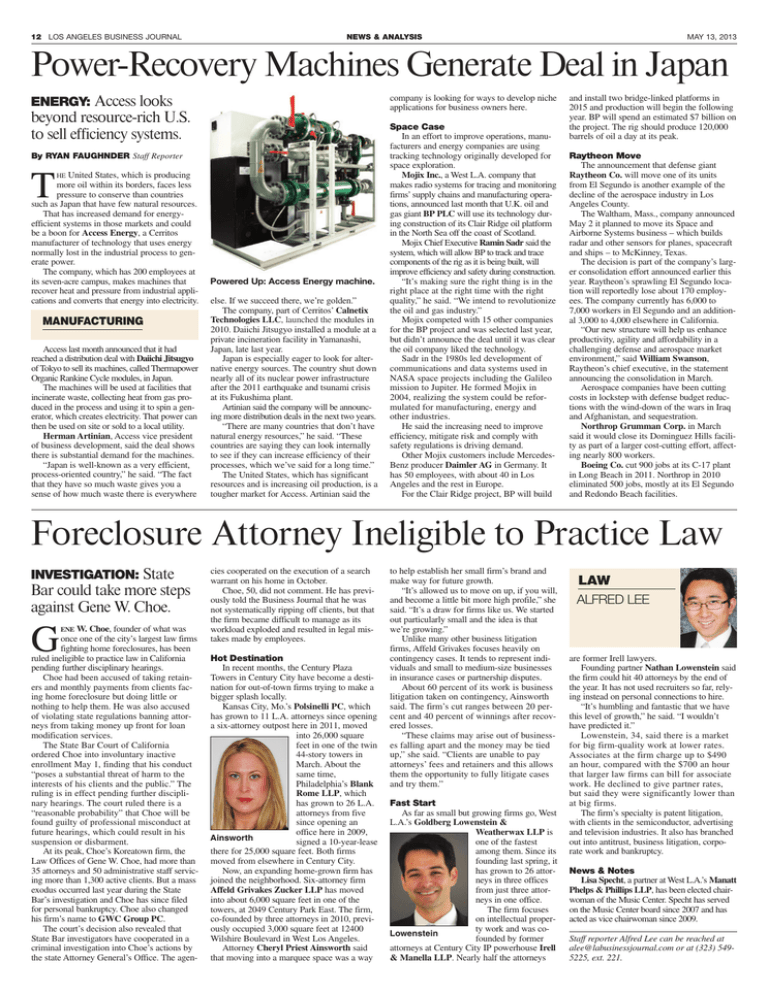Document 14481753
advertisement

12 LOS ANGELES BUSINESS JOURNAL NEWS & ANALYSIS MAY 13, 2013 Power-Recovery Machines Generate Deal in Japan company is looking for ways to develop niche applications for business owners here. ENERGY: Access looks beyond resource-rich U.S. to sell efficiency systems. By RYAN FAUGHNDER Staff Reporter T HE United States, which is producing more oil within its borders, faces less pressure to conserve than countries such as Japan that have few natural resources. That has increased demand for energyefficient systems in those markets and could be a boon for Access Energy, a Cerritos manufacturer of technology that uses energy normally lost in the industrial process to generate power. The company, which has 200 employees at its seven-acre campus, makes machines that recover heat and pressure from industrial applications and converts that energy into electricity. MANUFACTURING Access last month announced that it had reached a distribution deal with Daiichi Jitsugyo of Tokyo to sell its machines, called Thermapower Organic Rankine Cycle modules, in Japan. The machines will be used at facilities that incinerate waste, collecting heat from gas produced in the process and using it to spin a generator, which creates electricity. That power can then be used on site or sold to a local utility. Herman Artinian, Access vice president of business development, said the deal shows there is substantial demand for the machines. “Japan is well-known as a very efficient, process-oriented country,” he said. “The fact that they have so much waste gives you a sense of how much waste there is everywhere Powered Up: Access Energy machine. else. If we succeed there, we’re golden.” The company, part of Cerritos’ Calnetix Technologies LLC, launched the modules in 2010. Daiichi Jitsugyo installed a module at a private incineration facility in Yamanashi, Japan, late last year. Japan is especially eager to look for alternative energy sources. The country shut down nearly all of its nuclear power infrastructure after the 2011 earthquake and tsunami crisis at its Fukushima plant. Artinian said the company will be announcing more distribution deals in the next two years. “There are many countries that don’t have natural energy resources,” he said. “These countries are saying they can look internally to see if they can increase efficiency of their processes, which we’ve said for a long time.” The United States, which has significant resources and is increasing oil production, is a tougher market for Access. Artinian said the Space Case In an effort to improve operations, manufacturers and energy companies are using tracking technology originally developed for space exploration. Mojix Inc., a West L.A. company that makes radio systems for tracing and monitoring firms’ supply chains and manufacturing operations, announced last month that U.K. oil and gas giant BP PLC will use its technology during construction of its Clair Ridge oil platform in the North Sea off the coast of Scotland. Mojix Chief Executive Ramin Sadr said the system, which will allow BP to track and trace components of the rig as it is being built, will improve efficiency and safety during construction. “It’s making sure the right thing is in the right place at the right time with the right quality,” he said. “We intend to revolutionize the oil and gas industry.” Mojix competed with 15 other companies for the BP project and was selected last year, but didn’t announce the deal until it was clear the oil company liked the technology. Sadr in the 1980s led development of communications and data systems used in NASA space projects including the Galileo mission to Jupiter. He formed Mojix in 2004, realizing the system could be reformulated for manufacturing, energy and other industries. He said the increasing need to improve efficiency, mitigate risk and comply with safety regulations is driving demand. Other Mojix customers include MercedesBenz producer Daimler AG in Germany. It has 50 employees, with about 40 in Los Angeles and the rest in Europe. For the Clair Ridge project, BP will build and install two bridge-linked platforms in 2015 and production will begin the following year. BP will spend an estimated $7 billion on the project. The rig should produce 120,000 barrels of oil a day at its peak. Raytheon Move The announcement that defense giant Raytheon Co. will move one of its units from El Segundo is another example of the decline of the aerospace industry in Los Angeles County. The Waltham, Mass., company announced May 2 it planned to move its Space and Airborne Systems business – which builds radar and other sensors for planes, spacecraft and ships – to McKinney, Texas. The decision is part of the company’s larger consolidation effort announced earlier this year. Raytheon’s sprawling El Segundo location will reportedly lose about 170 employees. The company currently has 6,000 to 7,000 workers in El Segundo and an additional 3,000 to 4,000 elsewhere in California. “Our new structure will help us enhance productivity, agility and affordability in a challenging defense and aerospace market environment,” said William Swanson, Raytheon’s chief executive, in the statement announcing the consolidation in March. Aerospace companies have been cutting costs in lockstep with defense budget reductions with the wind-down of the wars in Iraq and Afghanistan, and sequestration. Northrop Grumman Corp. in March said it would close its Dominguez Hills facility as part of a larger cost-cutting effort, affecting nearly 800 workers. Boeing Co. cut 900 jobs at its C-17 plant in Long Beach in 2011. Northrop in 2010 eliminated 500 jobs, mostly at its El Segundo and Redondo Beach facilities. Foreclosure Attorney Ineligible to Practice Law INVESTIGATION: State Bar could take more steps against Gene W. Choe. G ENE W. Choe, founder of what was once one of the city’s largest law firms fighting home foreclosures, has been ruled ineligible to practice law in California pending further disciplinary hearings. Choe had been accused of taking retainers and monthly payments from clients facing home foreclosure but doing little or nothing to help them. He was also accused of violating state regulations banning attorneys from taking money up front for loan modification services. The State Bar Court of California ordered Choe into involuntary inactive enrollment May 1, finding that his conduct “poses a substantial threat of harm to the interests of his clients and the public.” The ruling is in effect pending further disciplinary hearings. The court ruled there is a “reasonable probability” that Choe will be found guilty of professional misconduct at future hearings, which could result in his suspension or disbarment. At its peak, Choe’s Koreatown firm, the Law Offices of Gene W. Choe, had more than 35 attorneys and 50 administrative staff servicing more than 1,300 active clients. But a mass exodus occurred last year during the State Bar’s investigation and Choe has since filed for personal bankruptcy. Choe also changed his firm’s name to GWC Group PC. The court’s decision also revealed that State Bar investigators have cooperated in a criminal investigation into Choe’s actions by the state Attorney General’s Office. The agen- cies cooperated on the execution of a search warrant on his home in October. Choe, 50, did not comment. He has previously told the Business Journal that he was not systematically ripping off clients, but that the firm became difficult to manage as its workload exploded and resulted in legal mistakes made by employees. Hot Destination In recent months, the Century Plaza Towers in Century City have become a destination for out-of-town firms trying to make a bigger splash locally. Kansas City, Mo.’s Polsinelli PC, which has grown to 11 L.A. attorneys since opening a six-attorney outpost here in 2011, moved into 26,000 square feet in one of the twin 44-story towers in March. About the same time, Philadelphia’s Blank Rome LLP, which has grown to 26 L.A. attorneys from five since opening an office here in 2009, Ainsworth signed a 10-year-lease there for 25,000 square feet. Both firms moved from elsewhere in Century City. Now, an expanding home-grown firm has joined the neighborhood. Six-attorney firm Affeld Grivakes Zucker LLP has moved into about 6,000 square feet in one of the towers, at 2049 Century Park East. The firm, co-founded by three attorneys in 2010, previously occupied 3,000 square feet at 12400 Wilshire Boulevard in West Los Angeles. Attorney Cheryl Priest Ainsworth said that moving into a marquee space was a way to help establish her small firm’s brand and make way for future growth. “It’s allowed us to move on up, if you will, and become a little bit more high profile,” she said. “It’s a draw for firms like us. We started out particularly small and the idea is that we’re growing.” Unlike many other business litigation firms, Affeld Grivakes focuses heavily on contingency cases. It tends to represent individuals and small to medium-size businesses in insurance cases or partnership disputes. About 60 percent of its work is business litigation taken on contingency, Ainsworth said. The firm’s cut ranges between 20 percent and 40 percent of winnings after recovered losses. “These claims may arise out of businesses falling apart and the money may be tied up,” she said. “Clients are unable to pay attorneys’ fees and retainers and this allows them the opportunity to fully litigate cases and try them.” Fast Start As far as small but growing firms go, West L.A.’s Goldberg Lowenstein & Weatherwax LLP is one of the fastest among them. Since its founding last spring, it has grown to 26 attorneys in three offices from just three attorneys in one office. The firm focuses on intellectual property work and was coLowenstein founded by former attorneys at Century City IP powerhouse Irell & Manella LLP. Nearly half the attorneys LAW ALFRED LEE are former Irell lawyers. Founding partner Nathan Lowenstein said the firm could hit 40 attorneys by the end of the year. It has not used recruiters so far, relying instead on personal connections to hire. “It’s humbling and fantastic that we have this level of growth,” he said. “I wouldn’t have predicted it.” Lowenstein, 34, said there is a market for big firm-quality work at lower rates. Associates at the firm charge up to $490 an hour, compared with the $700 an hour that larger law firms can bill for associate work. He declined to give partner rates, but said they were significantly lower than at big firms. The firm’s specialty is patent litigation, with clients in the semiconductor, advertising and television industries. It also has branched out into antitrust, business litigation, corporate work and bankruptcy. News & Notes Lisa Specht, a partner at West L.A.’s Manatt Phelps & Phillips LLP, has been elected chairwoman of the Music Center. Specht has served on the Music Center board since 2007 and has acted as vice chairwoman since 2009. Staff reporter Alfred Lee can be reached at alee@labusinessjournal.com or at (323) 5495225, ext. 221.


